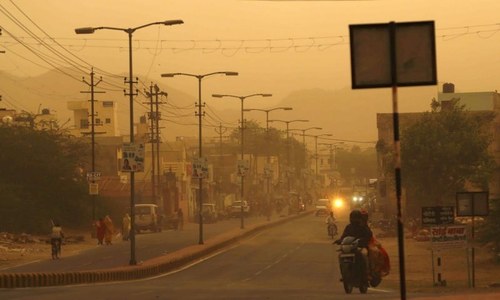ISLAMABAD / LAHORE: The country’s economy, already walking a tightrope, faces a grim scenario as the government is unlikely to achieve the wheat production target of 25.51 million tonnes this year — mainly because of extended spells of rain in Punjab and Khyber Pakhtunkhwa.
“The westerly wave affecting upper parts of the country is likely to move eastward during the next 12 hours,” said the Pakistan Meteorological Department (PMD) in its daily forecast on Wednesday evening. “This means the spell is over,” a Met official said.
The system, continuing for the past three days, produced heavy rains in many parts of the country on Wednesday, accompanied by hailstorm and severe windstorm, damaging wheat crops in the plains of Punjab, Balochistan and fruit crops over the hills.
According to officials, the system is set to move out of the country on Thursday (today).
Freak weather system to move out of country today
In Punjab alone, the initial wheat loss has been estimated to be over 200,000 tonnes, according to a senior official of the agriculture department.
Besides, the rains have left dozens of people dead and caused damage to houses and infrastructure in all the four provinces.
The Minister for National Food Security and Research, Sahibzada Mahboob Sultan, who chaired a meeting of the Federal Committee on Agriculture, said provincial governments had been asked to carry out estimates of losses in their areas. The minister said he had received reports of wheat crop losses from Jhang, Khanewal, Dera Ghazi Khan and Toba Tek Singh. Similarly, KP officials informed the meeting about such losses in certain areas of their province due to excessive rains.
After the availability of estimates, the ministry would be in a position to explain the extent of wheat crop loss, the minister said.
The FCA was informed that in certain parts of southern and central Punjab, yellow rust had been reported by the agriculture extension departments due to irregular spells of rains. The minister asked the PMD representatives to improve the forecasting system so as to alert the farming community about the weather conditions. The Met department should come up with accurate forecasts by making use of advanced technology, he emphasised.
The director general of the Punjab agriculture department, Dr Anjum Buttar, said rains coupled with hail storms had affected the wheat crop in about 15 districts.
On the other hand, PMD director general Muhammad Riaz said his organisation had timely issued the forecast for rain, storms and hail storms, claiming that 90 to 100 per cent of those forecasts were correct. As for the wheat crop losses, he pointed out, it was up to the agriculture department to advise the farmers accordingly so that they could take measures for the protection of crops.
Meanwhile, the FCA held detailed deliberations over the production targets for essential Kharif crops for 2019-20.
National Assembly Speaker Asad Qaiser expressed sadness over the loss suffered by the farmers and said he would request the prime minister to provide compensation to the farmers.
Presiding over a meeting of the National Assembly Special Committee on Agricultural Products, he vowed to improve the lot of small farmers, protect their interests and end their exploitation.
Reports from Balochistan say that rain and subsequent flood continue to wreak havoc on different areas as four more people lost their lives in weather-related incidents and many areas have been submerged by flash floods.
According to the National Disaster Management Authority, the furious freak weather system has claimed 50 lives and damaged nearly 117 houses in different parts of the country over the past few days.
Temperatures dropped significantly in the plains of Sindh and Punjab, making weather pleasantly cold at night.
Reports from different districts in south, central and north-eastern Punjab indicated heavy-to-moderate rain which further damaged the standing wheat crop.
Quoting the KP Provincial Disaster Management Authority, a report said that one each person died in Dera Ismail Khan, Karak, Swat, Haripur, Charsadda and Bajaur. Landslides were reported in Tank, Mansehra and Dir Upper.
Swat and Kabul rivers swelled at Khiyali and at Sardaryab and Hajizai, and the authorities had asked the people living in low-lying areas to move to safer place.
Quetta’s rail link with other parts of the country remained severed for 30 hours as the track linking Balochistan with Sindh and Punjab was washed away by floodwater between Bakhtiarabad and Notal area of Sibi district on Tuesday.
Traffic between Quetta and Islamabad was suspended due to landslides hitting the road between Zhob and Dera Ismail Khan areas.
Reports from diffident areas of Balochistan said it had been raining for the last four days and all seasonal rivers and nullahs had swelled.
Many villages have been cut off from Jhal Magsi as River Mola is carrying floodwater.
Published in Dawn, April 18th, 2019














































